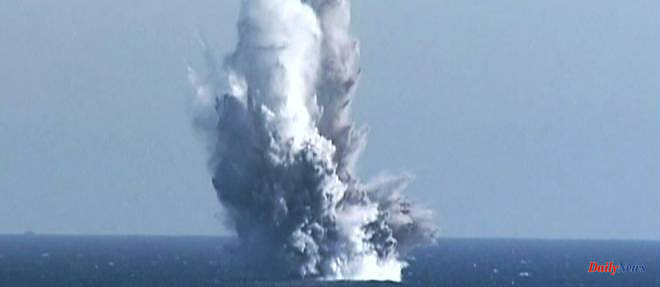North Korea claimed on Friday that it had tested an underwater nuclear attack drone capable of triggering a "radioactive tsunami", while blaming US-South Korean military exercises for the deterioration of the regional security.
Pyongyang conducted its own maneuvers this week, including testing a new submarine nuclear missile launch system, the North Korean state news agency KCNA said on Friday.
"This underwater nuclear attack drone can be deployed to any coast and port or towed by a surface ship," KCNA reported.
The purpose of this weapon is "to stealthily infiltrate operational waters and produce a large-scale radioactive tsunami [...] to destroy enemy naval attack groups and major operational ports," he said. she added.
North Korean leader Kim Jong Un personally supervised the trials, according to KCNA. Footage released by the official Rodong Sinmun daily shows a smiling Kim and what appears to be an underwater explosion.
The agency also claimed that Pyongyang on Wednesday fired strategic cruise missiles "equipped with a test warhead simulating a nuclear warhead".
Nonetheless, analysts have cast doubt on North Korea's claims.
The idea that Pyongyang has "a nuclear-capable underwater drone should be met with skepticism," said Professor Leif-Eric Easley of Ewha University in Seoul.
"Pyongyang's claims about a new weapons system are not the same as a credible demonstration of its capabilities," he added.
In a post on Twitter, US analyst Ankit Panda did not rule out that the test claim was an "attempted deception/psychological operation".
Despite everything, this assertion is "shocking", underlined to AFP Cheong Seong-chang, of the Sejong Institute.
If true, it's hard to see how Seoul "could respond to such a formidable new weapon from North Korea that (it says) can completely destroy major operational ports in the South."
KCNA also says that "Pyongyang is more than ready to use its tactical nuclear weapons at any time," An Chan-il, a defector turned researcher, told AFP.
Russia has also reportedly developed a similar weapon - nuclear-capable Poseidon torpedoes - but mastering the complex technology required for such weapons still appears to be beyond North Korea's reach, experts say.
"For an undetectable underwater unmanned drone, it requires advanced technology like control sensors and radar," Choi Gi-il, a professor of military studies at Sangji University, told AFP.
Pyongyang "is trying to advance and diversify the means of launching" warheads, he adds, however, specifying that new tests could still give Pyongyang new "formidable" means of delivering a nuclear charge.
After a record year of weapons testing and growing nuclear threats from Pyongyang in 2022, Seoul and Washington stepped up their defense cooperation and conducted their largest joint military exercises in five years from March 13-23, 2023. .
North Korea views all such drills as rehearsals for an invasion of its territory, and has repeatedly warned that it will respond to them in a "massive" manner.
On Friday, KCNA described the joint exercises between the United States and South Korea, dubbed "Freedom Shield", as an exercise aimed at "occupying" North Korea.
Pyongyang's "underwater nuclear attack drone" exercise was conducted "with the aim of warning the enemy against a real nuclear crisis", the agency reported.
Kim Jong Un also pointed out that the North's nuclear capabilities are "strengthening at a faster pace", according to KCNA.
In 2022, Pyongyang called its status as a nuclear power "irreversible". The North Korean leader recently called for an exponential increase in its production of weapons, including tactical nuclear weapons.
Washington has repeatedly reaffirmed its "unwavering" commitment to defending South Korea using "the full range of its military capabilities, including nuclear."
South Korea, for its part, is seeking to appease public opinion that is rather worried about American commitments in terms of so-called extended deterrence, which, thanks to American military means, including nuclear weapons, can prevent attacks against the allies.
Friday's statement comes about a week after Pyongyang test-fired its most powerful missile, the Hwasong-17, its second intercontinental ballistic missile (ICBM) test in 2023.
24/03/2023 11:39:27 - Seoul (AFP) © 2023 AFP












